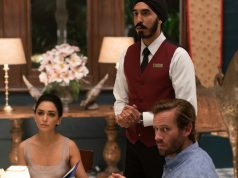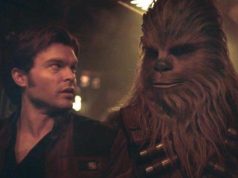I’ve often been tempted when reviewing sequels that do nothing more than mimic their predecessors to simply reprint what I wrote on the original film. “The Darjeeling Limited” marks the first time I’ve considered doing that for a non-sequel. Most of what I said about Wes Anderson’s last film, “The Life Aquatic with Steve Zissou,” applies to this one, too.
For example, in the following excerpt, replace “The Life Aquatic” with “The Darjeeling Limited”:
A Wes Anderson film is always a thing of inspired, calculated madness, so much like his other films that you’d think he made them all in the same month. His previous movies, “Bottle Rocket,” “Rushmore” and “The Royal Tenenbaums,” established his template, and now “The Life Aquatic with Steve Zissou” fills in the blanks again.
I say this as a Wes Anderson fan, but one who is becoming slightly less enamored of Anderson’s cinematic tricks as time goes on. “The Life Aquatic” is a delight, but it doesn’t feel as fresh and surprising as, say, “Rushmore” did. Still, I’ll take a filmmaker who keeps using the same interesting devices over one who doesn’t even know any.
Or this:
[Certain characters] are there (as are many elements in the film) mainly because Wes Anderson thought it would be amusing to put them there…. Anderson belongs to the same school of filmmaking as the Coen Brothers, where even the characters with only a couple lines are brimming with kooky personality.
Hmm, this applies, too:
Many viewers will be turned off by the film altogether, as it is surreal and stylized, with even ordinary conversations about ordinary things getting the Wes Anderson treatment.
And finally:
The film … is emotionally distant. You almost have to work at it to feel what [the characters] are feeling.
The characters in “Darjeeling” are the Whitman brothers, Francis (Owen Wilson), Peter (Adrien Brody), and Jack (Jason Schwartzman). They come from a wealthy family and have not communicated since their father’s funeral a year ago. Now Francis, the eldest and bossiest, has summoned them to India to embark on a spiritual journey. He wants to heal their fractured fraternal bonds.
As the brothers reunite on the titular train, it’s fun to see them slip back into the comfortable rhythms of brotherhood, with old jokes and grudges surfacing again. They haven’t been out of touch for a year because they were angry with each other. They simply needed time to go their separate ways and deal with their father’s death.
They’re still healing, and Anderson handicaps them all in some physical way to represent this. Francis’ head is bandaged up following a motorcycle accident. Peter has swiped a few of Dad’s minor, useless possessions, including his eyeglasses, which make Peter’s vision worse. Jack is almost always barefoot, a fact which is never explained or even referred to.
(Another bit of Anderson’s symbolism is even less subtle: The guys are using Dad’s Louis Vuitton luggage — carrying around their father’s baggage, get it?)
As always, there are many laughs to be had in the characters’ deadpan delivery of strange, intentionally stilted dialogue, as well as in the understated and decidedly non-wacky physical comedy. Everything in the film occurs without fanfare, without having attention drawn to it. When the camera moves, it’s fluid and unhurried, and it often forces the characters to catch up with it in order to stay in the frame. The impression is that we’re observing the brothers’ twee little world from the outside, and that it’s up to them to stay in our view if we happen to turn away.
The film take a more blatantly serious turn in the third act than most of Anderson’s previous stories have done, hinting at the emotions that are at the surface for the characters but that still feel deeply buried to us. I often found myself wanting to feel what the Whitman brothers were feeling, yearning to sympathize with them and to feel an emotional catharsis to compare with theirs. It never came.
Anderson isn’t a one-trick pony by any stretch. He’s a multi-talented pony whose tricks are endlessly amusing and entertaining, whose sense of visual style is particularly refreshing. The problem is, no matter how many tricks that pony has, if he keeps doing the same ones over and over again, they’re going to get stale. I think if you’ve never seen an Anderson film, this one will strike you as likably odd and unconventional. If you’ve seen the others, this will feel like a repeat. A good repeat, sure, but still a repeat.
B- (1 hr., 31 min.; )





